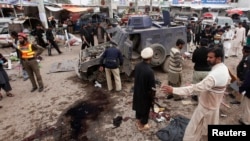ISLAMABAD —
A bomb blast near a police vehicle in the northwestern Pakistani city of Peshawar has killed at least three people. The latest attack will likely further fray support for government efforts to reach a peace settlement with the Taliban through dialogue.
Shoppers were crowding into a Peshawar market for their weekend purchases when a bomb exploded, killing and injuring dozens of people.
Police superintendent Faisal Kamran said the target of the suicide blast was an armored police vehicle nearby. Taliban militants constantly attack police and other security personnel in Pakistan.
He said the armored personnel carrier was carrying a police sub-inspector and three other officers, but they are safe. The blast took place in a crowded place so some 25 people are wounded, and there are reports of five dead. He says police are moving in to secure the area.
The latest attack in the volatile northwestern city of Peshawar, not far from militant strongholds in Pakistan’s western tribal belt, could further erode support for government attempts at peace talks with Taliban militants. Critics have said negotiations will only give militants time to regroup.
Earlier this week, government peace negotiator Irfan Siddique said the faltering dialogue had entered a decisive phase after the Taliban declared a temporary cease-fire.
The Taliban has shied away from claiming responsibility for ongoing militant violence. Analysts say repeated deadly attacks indicate that either the militants are not seriously pursuing peace, or that they no longer control the various extremist factions operating under their Tehreek-e-Taliban umbrella network.
Security analyst, retired brigadier Saad Muhammad criticizes the government approach as an ineffective policy of appeasement.
“This insurgency which is now in Pakistan is an expanding insurgency," he said. "Why in the world would the terrorists, or the insurgents, would be willing to lay down their arms? What is compelling them to lay down their arms?”
Pakistan’s government has said that the dialogue has entered a “final and decisive” stage, but has not specified what will happen if the talks break down.
Representatives nominated by the Taliban to represent them in the talks with the government traveled this week to North Waziristan to consult with the militant leaders on how to move the talks forward.
The army, meanwhile, has already positioned itself for a military offensive in the tribal area of North Waziristan. Saad Muhammad says the new military leadership is ready to strike.
“The present lot which is now at the top feels that this thing has to be sorted out and there is no other way except [to] get to these people,” he said.
Also on Friday, a remote-controlled bicycle bomb in the southwestern province of Baluchistan killed at least seven people. The blast, on a busy crossroads in the provincial capital of Quetta, appeared to target security personnel traveling on the road at the time.
Police said all the victims were civilians.
Baluchistan suffers from a violent nationalist insurgency, but Taliban extremists also operate in and around Quetta and use routes leading from there to the volatile tribal areas.
Shoppers were crowding into a Peshawar market for their weekend purchases when a bomb exploded, killing and injuring dozens of people.
Police superintendent Faisal Kamran said the target of the suicide blast was an armored police vehicle nearby. Taliban militants constantly attack police and other security personnel in Pakistan.
He said the armored personnel carrier was carrying a police sub-inspector and three other officers, but they are safe. The blast took place in a crowded place so some 25 people are wounded, and there are reports of five dead. He says police are moving in to secure the area.
The latest attack in the volatile northwestern city of Peshawar, not far from militant strongholds in Pakistan’s western tribal belt, could further erode support for government attempts at peace talks with Taliban militants. Critics have said negotiations will only give militants time to regroup.
Earlier this week, government peace negotiator Irfan Siddique said the faltering dialogue had entered a decisive phase after the Taliban declared a temporary cease-fire.
The Taliban has shied away from claiming responsibility for ongoing militant violence. Analysts say repeated deadly attacks indicate that either the militants are not seriously pursuing peace, or that they no longer control the various extremist factions operating under their Tehreek-e-Taliban umbrella network.
Security analyst, retired brigadier Saad Muhammad criticizes the government approach as an ineffective policy of appeasement.
“This insurgency which is now in Pakistan is an expanding insurgency," he said. "Why in the world would the terrorists, or the insurgents, would be willing to lay down their arms? What is compelling them to lay down their arms?”
Pakistan’s government has said that the dialogue has entered a “final and decisive” stage, but has not specified what will happen if the talks break down.
Representatives nominated by the Taliban to represent them in the talks with the government traveled this week to North Waziristan to consult with the militant leaders on how to move the talks forward.
The army, meanwhile, has already positioned itself for a military offensive in the tribal area of North Waziristan. Saad Muhammad says the new military leadership is ready to strike.
“The present lot which is now at the top feels that this thing has to be sorted out and there is no other way except [to] get to these people,” he said.
Also on Friday, a remote-controlled bicycle bomb in the southwestern province of Baluchistan killed at least seven people. The blast, on a busy crossroads in the provincial capital of Quetta, appeared to target security personnel traveling on the road at the time.
Police said all the victims were civilians.
Baluchistan suffers from a violent nationalist insurgency, but Taliban extremists also operate in and around Quetta and use routes leading from there to the volatile tribal areas.








